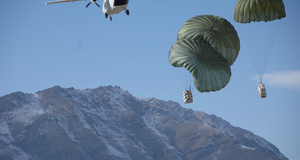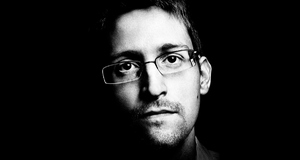From Interstate - Journal of International Affairs VOL. 1996/1997 NO. 1Western Intelligence - Nothing More Than A Cold War Relic?
By
Interstate - Journal of International Affairs 1997, Vol. 1996/1997 No. 1 | pg. 1/1
KEYWORDS:
I have not seen Goldeneye (honest!) but I do remember a clip where James Bond is admonished as a “relic” for not being able to keep up with events after the Cold War. However the quote is interesting as regards the future for the Western intelligence community. The implication being that spies are no longer required nowadays, certainly if they are in any way like James Bond! This article will examine the future challenges to Bond’s non-fictional contemporaries in the post-Cold War world and how they must adapt. The termination of the Cold War has meant dramatic changes for the Western intelligence services. The intensity of the infamous espionage conflict of the Cold War between the liberal-democratic West and the communist East is over. The Committee for State Security (KGB), like the Union of Soviet Socialist Republics (USSR), has been abolished. The somewhat reassuring rigidity of the Cold War has been replaced by a mixture of old and new threats. Intelligence is still required. The only certain feature in the post-Cold War world is that the Western intelligence services will have to perform more tasks with less money. But the services have been adapting. Western intelligence – as if it really were such a single entity – now has the chance to grasp this unprecedented opportunity. Western intelligence requirements have not diminished with the end of the Cold War. Never before in the history of Western intelligence has there been such a momentous occasion to make a fresh start. The intelligence services have never been so professional or had such advanced technology at their disposal. Improvements in deference to the new climate will improve the quality of the services. Such improvements would make the services more forward thinking and have less Cold War tunnel vision. The end of the Cold War has had profound implications for the West. Clearly, it is no longer business-as-usual. “U.S. intelligence must now come to resemble a wide-angle lens, focusing equally on a host of different countries and issues.” (McCurdy,1994,p.125). National Security Review No.29 (NSR-29) was signed in 1991 by President George Bush. This was a menu of old and new requirements, including the recognition of problems such as migration and disease. Adams tells us that a national body was created in 1992 to co-ordinate all US intelligence services that use human intelligence (HUMINT). This is for better use of resources, although one is surprised something this obvious did not happen decades ago. Congress voted an additional $50 million to the requested amount for US HUMINT, at a time of broad financial cut backs. This demonstrates the continued importance of HUMINT in the post-Cold War world. Other Western services have also been justifying their existence and identifying new challenges. The British Secret Intelligence Service (SIS) now spends: 15% on the former Soviet Union (compared with 37% at the height of the Cold War), 15% on the Middle East, 4% on Argentina,10% on counter-terrorism, 10% on proliferation generally,10% on the former Yugoslavia, 5% on Southern Africa, 2% on Japan, 5% on counter-narcotics and 5% on money laundering. (Adams,1994,p.100). This example appears to be representative of the major Western intelligence services. While it is difficult to write about intelligence at all, (the limited sources, the retired intelligence officer with his/her own agenda etc. etc.) one imagines that most Western services will have similar interests like the British. Paradoxically there is a wider range of issues which are of varying interest to the West after the Cold War than there was before. In a sense one had only to worry about the USSR en masse, as opposed to the chaos, corruption and misery that now reign supreme in the former USSR. All agencies will be under pressure to be more efficient and cost-effective. With the discipline of the market place (possibly) at work in the services, one can imagine roster sheets for officers having to recruit X number of sources per month! Perhaps the essential Cold War characteristic was secrecy. A good example is the British. The disturbingly true cliché of Whitehall’s obsession with secrecy was taken to new, and often farcical extremes, as seen in the “Spy catcher” debacle. The legal representative of the British government in an Australian court would not admit to even the existence of the British Security Service (MI5)! But recently the British have slowly been emerging from the Cold War shadows. This is only to be welcomed but the openness could be greater. It is also reasonable to assume other Western services will reflect the American-inspired drive towards greater openness and accountability. (seedy-looking bloke 1): “Aaah, have you a gift for our dinner?” (seedy-looking bloke 2): “Yes, I’ve got some bisto gravy!” The Central Intelligence Agency (CIA) has established four groups to enhance US intelligence after the Cold War. The groups are concerned with countering drugs, terrorism, the proliferation of weapons of mass destruction; and counter-intelligence. Also there were teams who set about studying the likely political, economic, social, military and technological issues in the former USSR. Other such “task forces” focused on better exploitation of open sources – the main supply of knowledge for all services – as well as covert action, training and other areas. This is symptomatic of what other Western services will have been doing in terms of radically re-thinking their basic goals and capabilities. The implosion of the Eastern bloc has allowed the West to reorganise themselves so as to be more prepared in facing up to future challenges. This reorganisation will (ideally) be extremely thorough. For example, Ott complains that only a few years ago, an average analytical report had to pass eight layers of review in the CIA, before approval for dissemination. Few imaginative or bold interpretations could survive such a process intact. Basic reforms of procedures like this would strengthen Western intelligence. The new era has with it some continuities from the Cold War. Western military commanders still need accurate and recent intelligence. While inter-state wars seem to be declining, Western forces require strategic and tactical intelligence for a number of scenarios. This will vary from examples of the Gulf War of 1991 to counter- intelligence to prevent leakage of Western strengths and weaknesses. Political intelligence is always needed. This is especially so with the former communist regimes of the Eastern bloc, for example the possibility of a coup by hard-line military elements in Russia. Intelligence can help identify potential crises so the West can react more effectively. But intelligence cannot guarantee an affective response. Another element of continuity from the Cold War is the continuing level of espionage by the Russian External Intelligence Service (SVR) which replaced the KGB and Russian Military Intelligence (GRU). Simultaneously there has been a Russian charm offensive stressing the need for co-operation between old enemies. Adams writes that two SVR teams visited SIS in 1992. SIS asked them for details about a group of Iranians visiting Moscow who were known to be connected to their government’s arms procurement programme. Nothing of any value was passed on to SIS. The CIA and SIS are continuing to recruit sources in the former USSR. Another telling aspect is that Russia has reportedly refused to share information on terrorism or the procurement networks of rogue states. In this sense at least, it seems to be business as usual. The proliferation of conventional weapons, as well as nuclear, biological and chemical (NBC) weapons are of great concern for the West. Recent experience with Iraq shows how alert the West must be. There is legitimate concern for NBC capabilities falling into the hands of states and parties that defy international norms and conventions. Waltz’s “more may be better” argument is flawed. If ever more states acquired such awesome abilities this would only breed further instability and arms racing. Good intelligence on these rogue states may be instrumental in harnessing international opposition. According to Adams there are some 30,000 nuclear warheads in Russia and already it has been admitted that some warheads are “missing”! Impoverished ex-Soviet scientists are being offered attractive salaries to work in states like Iran. Some two dozen states are thought to be seeking (non-nuclear) weapons of mass destruction. Western intelligence can only do its best (which may not be enough) to warn their governments. Stopping them is another matter. For example, the Israeli service, Mossad, can only kill so many scientists. Proliferation is perhaps the most difficult problem facing the West. Terrorism has proved to be a stubborn problem. Breckinridge rates this as perhaps the most problematical assignment for intelligence, certainly proliferation is easier to detect. Terrorist groups are small, ruthless, extremely secretive and aided by a number of states. The excellent communications and open society of the West gives terrorists much of the initiative. Terrorist cells can be immensely difficult to penetrate. Advanced technology is of limited use, HUMINT is the main weapon. Terrorism can be home-grown. The Oklahoma bomb of 1995 killed about 200 people. It was initially assumed to be the work of Moslem fundamentalists. The tragedy was compounded when news emerged that the terrorists were fellow Americans. The West should not dismiss the possibility of domesticated extremists, as well as foreign ones like Moslem radicals. The post-Cold War domain has raised the issue of economic espionage. This is acquiring economic information covertly which would be of benefit to your economy. Some states, Western ones included, have no reservations with economic espionage. Adams notes that there appears to be general opposition to Western services dipping their toe(s) in the murky pool of economic espionage. It is of debate (but it is my opinion) that engaging in this activity runs contrary to the spirit of free trade . Sensitive economic information does not remain sensitive for long. The US has a stake, if not domination, in many multinational corporations (MNCs). Should the CIA spy on American citizens employed in MNCs? How does a service disseminate intelligence without favouring one company over another? This, I feel, is an area to be avoided.
Cold War politics made the United Nations (UN) impotent. Now, the UN is an important actor. In 1993 alone, Smith tells us that over 200 personnel were killed on UN duties. The UN needs intelligence. Member states, especially the West ,should (must?) share intelligence with the UN. The UN Situation Centre was created in 1993. This works non-stop, processing information from UN operations and making reports for the UN Secretary General. Do not think that the UN has turned to cloak and dagger operations. All information flowing to the UN is strictly from open sources only. Even the term UN intelligence implies that the UN has friends and enemies. Western services can and should contribute where possible, after all, they have been doing so for decades as North Atlantic Treaty Organisation (NATO) allies. Recently the CIA furnished satellite photographs of suspected mass graves in Bosnia-Hercegovina. (Of course it would have been better had the UN been given this materiel as the atrocity unfolded.) In the Cold War security was seen in terms of strategic reductionism. Yet environmental problems can cause security issues. We saw this when Iraq burnt Kuwaiti oil wells in the Gulf War of 1991. Intelligence can contribute to scientific understanding of the earth and its problems. Scientists are unaware of the true scale of global warming. In 1990 the Strategic Defence Initiative Organisation (SDIO) allocated computer time for scientists to conduct atmospheric modelling. The military tend to have more sophisticated computers than civilian scientists. There are a number of ways intelligence services could help. One example is that by examining records of satellites going back a couple of decades, we can learn how parts of the planet are being affected over time. Western intelligence can target international organised crime. Today it is very sophisticated. Money laundering is a significant problem and investigations can give clues on the activities of criminals as well as terrorists. In 1996, MI5 was given wider powers to tackle organised crime and now has the power of arrest, there is increasing co-operation between Western intelligence and police services. We have seen a host of fresh and more familiar problems facing the West. The common dangers we face demand the West not only retain but improve their intelligence capabilities, despite the demise of the Cold War. This continues to have staggering ramifications for the Western services, heralding new reforms and assessments. James Bond has not retired, what we should have now is the new improved version. The West has a wondrous opportunity to build a close relationship with the former enemies of the Cold War. By coming together and co- operating at a fundamental level we will be reinforcing our common security. Other “Western” services like Australia should become more involved. The intelligence community now has a chance to develop strong links with the UN and with environmental institutions. (Wouldn’t it be ironic if the French began helping Green peace?) Services must continue to come in from the cold and to shake off their Cold War mentality if they are to be useful tin the twenty-first century. Finally, the West should release records. On the one hand this would try to be for the satisfaction of history, and on the other hand being careful not to compromise past or present personnel, sources and methods. The best thing that could happen would be the degree of co-operation among the services as seen during the Gulf War of 1991 (a concerted drive against a feared terrorist campaign). Non- Western states would ideally contribute intelligence and be more open. The result would be more timely and accurate intelligence. This had been their raison d’être in the Cold War and continues to be so today. Endnotes1. The New Spies, J. Adams, 1994 2. Security Issues in the Post-Cold War World, ed. M. Davies, 1996 3. Loose Nukes (K.Booth), Arms Control 1992 4. Intelligence and UN Peacekeeping (H. Smith), Survival, 1994 5. Glastnost for the CIA (D. McCurdy), Foreign Affairs, 1994 6. Shaking up the CIA(M. Ott), Foreign Policy, 1993 7. The Shape of Post-Cold War Intelligence (S. Breckinridge), International Journal of Intelligence and Counter- Intelligence, 1995 Suggested Reading from Inquiries Journal
Inquiries Journal provides undergraduate and graduate students around the world a platform for the wide dissemination of academic work over a range of core disciplines. Representing the work of students from hundreds of institutions around the globe, Inquiries Journal's large database of academic articles is completely free. Learn more | Blog | Submit Latest in International Affairs |

















